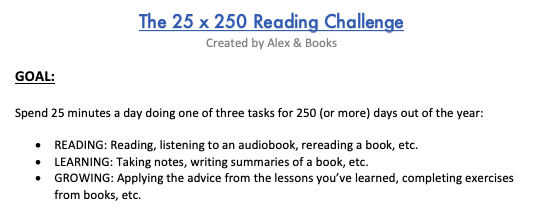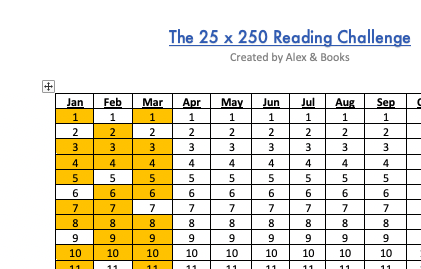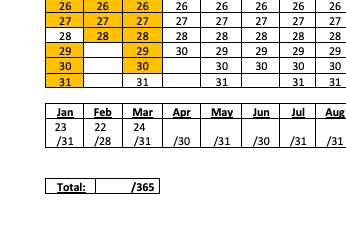This year I completed the 52 book challenge for the first time ever.
What did I learn from this hitting this goal?
The 52 book challenge is flawed and outdated.
Here's why (plus a free & better reading challenge for you):
(thread)
What did I learn from this hitting this goal?
The 52 book challenge is flawed and outdated.
Here's why (plus a free & better reading challenge for you):
(thread)

0/ Background
The goal of the 52 book challenge is to read 52 books in 52 weeks.
It's a popular challenge for readers:
• The r/52books subreddit has 132k+ subs
• Goodreads has over 5.3 MILLION users participating in the challenge
BUT...this challenge has a ton of flaws
The goal of the 52 book challenge is to read 52 books in 52 weeks.
It's a popular challenge for readers:
• The r/52books subreddit has 132k+ subs
• Goodreads has over 5.3 MILLION users participating in the challenge
BUT...this challenge has a ton of flaws
0/ (continued)
At first glance, the challenge seems great:
• Gives people a big goal to strive for
• Encourages people to read more
• Easy to measure success
However, the incentives of this challenge aren't properly aligned for becoming a better reader.
Here's why:
At first glance, the challenge seems great:
• Gives people a big goal to strive for
• Encourages people to read more
• Easy to measure success
However, the incentives of this challenge aren't properly aligned for becoming a better reader.
Here's why:
1/ Bad Incentives
There are several bad incentives from this challenge. It encourages:
• Quality over quantity
• Punishes long books
• Forces reading for stats
• Values reading over reflection or action
Let's dive into each:
There are several bad incentives from this challenge. It encourages:
• Quality over quantity
• Punishes long books
• Forces reading for stats
• Values reading over reflection or action
Let's dive into each:
2/ Quality over quantity
On the 52books subreddit, users commonly brag about reading 100 or even 200 books a year.
Do these people actually enjoy reading all of those books or are they trying to read as many books as possible to impress their peers and seek validation?
On the 52books subreddit, users commonly brag about reading 100 or even 200 books a year.
Do these people actually enjoy reading all of those books or are they trying to read as many books as possible to impress their peers and seek validation?
2/ (continued)
People tend to believe that the more books someone has read, the "smarter" or "better" they are.
But that isn't the case.
Reading shouldn't be a competition to get through as many books as possible. Instead, focus on how many books get through you.
People tend to believe that the more books someone has read, the "smarter" or "better" they are.
But that isn't the case.
Reading shouldn't be a competition to get through as many books as possible. Instead, focus on how many books get through you.
3/ Punishes long books
The 52 challenge discourages people who want to read longer books since it rewards people for reading books and doesn't count metrics like time spent reading.
Such incentives alter a person's reading plan.
I know this from personal experience...
The 52 challenge discourages people who want to read longer books since it rewards people for reading books and doesn't count metrics like time spent reading.
Such incentives alter a person's reading plan.
I know this from personal experience...
3/ (continued)
Earlier this year I wanted to read the Bible.
BUT since it's 1,200+ pages long, I knew reading it would decrease my chances of hitting the 52 book goal.
It also stopped me from reading the Pulitzer Prize Frederick Douglass's biography since it was 900+ pages..
Earlier this year I wanted to read the Bible.
BUT since it's 1,200+ pages long, I knew reading it would decrease my chances of hitting the 52 book goal.
It also stopped me from reading the Pulitzer Prize Frederick Douglass's biography since it was 900+ pages..
4/ Forces reading for stats
Just how the 52 book goal discourages people from reading long books, it also discourages people from quitting bad books.
It forces people to read books they don't enjoy because they want to say they've read it and count it as one of their 52 books.
Just how the 52 book goal discourages people from reading long books, it also discourages people from quitting bad books.
It forces people to read books they don't enjoy because they want to say they've read it and count it as one of their 52 books.
4/ (continued)
If someone's 30% or even 70% through with a book but they aren't enjoying it, they shouldn't have to feel forced to finish it.
Instead, they should be able to switch to a different book and be rewarded for being a reader in general.
If someone's 30% or even 70% through with a book but they aren't enjoying it, they shouldn't have to feel forced to finish it.
Instead, they should be able to switch to a different book and be rewarded for being a reader in general.
5/ Values reading over learning or growing
Reading books is great BUT...it's only part one of improving your life.
In the current book challenge, here's no incentive to:
• take notes while reading
• reflect on new ideas
• apply the lessons you've learned
Reading books is great BUT...it's only part one of improving your life.
In the current book challenge, here's no incentive to:
• take notes while reading
• reflect on new ideas
• apply the lessons you've learned
5/ (continued)
What's the point of reading 52 books if you aren't remembering or applying what you've learned?
People should be rewarded for spending time taking notes on what they've learned, organizing valuable insights, and applying advice to improve their life.
What's the point of reading 52 books if you aren't remembering or applying what you've learned?
People should be rewarded for spending time taking notes on what they've learned, organizing valuable insights, and applying advice to improve their life.
6/ The Solution
The 25 x 250 Reading Challenge
(free worksheet below)
Spend 25 minutes a day doing one of three tasks for 250 (or more) days out of the year:
• Reading
• Learning
• Growing
The 25 x 250 Reading Challenge

(free worksheet below)
Spend 25 minutes a day doing one of three tasks for 250 (or more) days out of the year:
• Reading
• Learning
• Growing
6/ (continued)
This reading challenge rewards people for reading books, taking the time to remember what they're read, and for actually taking action on the lessons they've learned.
It also solves all the bad incentives in the 52 book challenge.
This reading challenge rewards people for reading books, taking the time to remember what they're read, and for actually taking action on the lessons they've learned.
It also solves all the bad incentives in the 52 book challenge.
7/ Good incentives
The 25 x 250 book challenge isn't about competing for who can read the most books.
• It's not about reading more, it's about reading BETTER.
It's about quality reading, not quantity reading.
The 25 x 250 book challenge isn't about competing for who can read the most books.
• It's not about reading more, it's about reading BETTER.
It's about quality reading, not quantity reading.
7 (continued)
It doesn't punish you for reading long books.
Nor does it force you to finish bad books.
And it motivates people to go above the passive consumption of reading by encouraging people to spend time applying the knowledge they've gathered.
It doesn't punish you for reading long books.
Nor does it force you to finish bad books.
And it motivates people to go above the passive consumption of reading by encouraging people to spend time applying the knowledge they've gathered.
8/ How it works
I created a simple one-page worksheet that shows all the days of 2021.
(You can print it out or use it as a digital file)
Each day you spend 25 minutes reading, learning, or growing, mark that date with a simple check or color it with a highlighter.
I created a simple one-page worksheet that shows all the days of 2021.
(You can print it out or use it as a digital file)
Each day you spend 25 minutes reading, learning, or growing, mark that date with a simple check or color it with a highlighter.
8/ (continued)
At the end of each month, tally up how many days you spent reading, learning, or growing.
Then repeat the same process every month till the end of the year.
Aim to spend 250 days (or more) reading, learning, or growing.
At the end of each month, tally up how many days you spent reading, learning, or growing.
Then repeat the same process every month till the end of the year.
Aim to spend 250 days (or more) reading, learning, or growing.
You can learn more about the 25 x 250 challenge and get the worksheet for it for FREE here: https://gum.co/KchJc

 Read on Twitter
Read on Twitter







